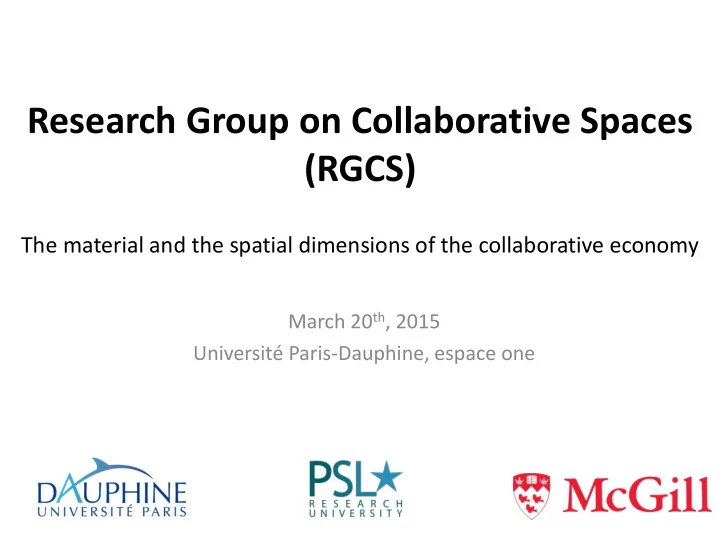

Research Group on Collaborative Spaces (RGCS) The material and the spatial dimensions of the collaborative economy March 20 th , 2015 Université Paris-Dauphine, espace one
What is RGCS? • Working group founded in November 2014. • To encourage and support research projects on the spatial, material and temporal dimensions of the collaborative economy , specifically practices and processes at the heart of value creation in organisations, in cities and in society at large. • Bringing together researchers interested in new physical, technological and social spaces at the core of the new collaborative economy: co-working spaces, fab labs, maker spaces, hacker spaces, new open spaces, BYOD, mobile work, social initiatives, etc.
RGCS’ ambition Encouraging research projects and research conversations for researchers in and among 3 cities: • Paris, France • London, UK • Montreal, Canada
Coordination: Julie Fabbri, Pierre Laniray and François-Xavier de Vaujany Paris Chapter London Montreal RGCS Chapter Chapter Coordination: Coordination: Hélène Lambrix, Yesh Nama Emmanuelle Vaast and and Nathalie Mitev Anouk Mukherjee Local + Thematic coordination
Five key themes Theme 1: New forms of collaboration in coworking and fablab spaces Theme 2: Digital transformation, spaces and new forms of collaboration Theme 3: Urban policy, collaborative spaces and business models Theme 4: New collaborative spaces, communication and legitimacy Theme 5: Social movements and institutional logics: identity and dynamics of collaboration
Theme 1 New forms of collaboration in coworking and fablab spaces • Ethnographic, case-study-based research • Collaborative spaces themselves (coworking, fablabs) • Control mechanisms (vs. open spaces) • Spatial and temporal analyses of coworking. • Corporate translation and appropriation of coworking spaces • One empirical field: university coworking spaces at PSL Coordinators : Julie Fabbri (julie.fabbri@polytechnique.edu) and Anouk Mukherjee (anouk.mukherjee@dauphine.fr)
Theme 2 Digital transformation, spaces and new forms of collaboration • Digital transformation which extends spaces • Integration into organizational spaces • Any place (bar, plane) or workplace can become a collaborative space (BYOD, mobile technologies, MOOC, social networks, etc.) Coordinators : Pierre Laniray (pierre.laniray@dauphine.fr) and Christophe Elie-Dit- Cosaque (celieditcosaque@gmail.com)
Theme 3 Urban policy, collaborative spaces and business models • Public policy concerned with developing a collaborative economy in national territories and specifically cities, with symbolic sites (Shoreditch , Techcity in London, La Ruche in Paris, QI in Montreal) • Territorial and institutional approach to space and business models • PSL as a possible field site (as an urban distributed new campus). Coordinator: Fabrice Perriac (fabrice.periac@gmail.com) and Stefan Haefliger (Stefan.Haefliger.1@city.ac.uk)
Theme 4 New collaborative spaces, communication and legitimacy • Communicative practices and narratives about the collaborative economy (e.g. corporate tours, campus tours) as legitimation for organisations and managers • PSL as a field site Coordinators: François-Xavier de Vaujany (devaujany@dauphine.fr) and Emmanuelle Vaast (emmanuelle.vaast@mcgill.ca)
Theme 5 Social movements and institutional logics: identity and dynamics of collaboration • Social movements and communities involved in building the collaborative economy • Coworking as a social movement and community • Sociological and historical approach • Micro/macro dimensions of collaborative spaces • Studying actors such as: entrepreneurs, users, public agencies, small retailers Coordinators: Hélène Lambrix (helene.lambrix@gmail.com) and Pierre Labardin (pierre.labardin@dauphine.fr)
2. Beyond the working group… PSL • PSL is a major research university and research sponsor in France • We intend to submit two proposals
Beyond the working group… PSL • Strategic alliance between twenty-one French institutions sharing common values and practices. • Founded in April 2010 by five prominent Paris institutions : the École Normale Supérieure, the Collège de France, the Paris Observatory, Chimie ParisTech and ESPCI ParisTech. • PSL has known a significant growth in its membership, as new institutions adhered to it in the framework of scientific and academic cooperation : Curie Institute (Paris), Mines ParisTech, Paris- Dauphine University, CNSAD, Conservatoire national supérieur de musique et de danse de Paris, École nationale supérieure des arts décoratifs, École nationale supérieure des Beaux-Arts, La Fémis, Fondation Pierre-Gilles de Gennes pour la recherche, IBPC - Fondation Edmond de Rothschild, Institut Louis Bachelier, Lycée Henri-IV, Centre national de la recherche scientifique, French Institute of Health and Medical Research, French Institute for Research in Computer Science and Automation, Association Art et Recherche. • One of the eight French "Excellence Initiative" - large scale research and higher education projects chosen by an international panel of experts - PSL received government approval in July 2010 and gained a legal status as an endowment. • In the long run it aims at becoming a world-class leader in education and research, building upon its excellent potential.
Beyond the working group… PSL • PSL Council for Research: calls for proposals (3 waves) • For PSL researchers and research directors (units, federations) • High international visibility and collaboration • Original, pioneer, ambitious research • Collaboration between several PSL members/institutions • Reviewed by international experts (research quality, synergy between disciplines and institutions, contribution to structuring research)
The steering committee of RGCS Steering committee of the RGCS: - Eva Boxenbaum (Copenhagen Business School and Mines ParisTech) - Stewart Clegg (University of Technology, Sydney) - Sébastien Damart (Université Paris-Dauphine) - Stefan Haefliger (Cass Business School) - Matthew Jones (Cambridge University, JBS) - Nathalie Mitev (LSE) - - Mark Thompson (Cmabridge University, JBS) - Emmanuelle Vaast (McGill University) - François-Xavier de Vaujany (Université Paris-Dauphine, project coordinator).
Next steps + A few questions for you • March 27 th : list of researchers interested in joining working group • April 3 rd : Submission PSL proposal • Q1: Is there a theme that you find promising, related to your own research interests? • Q2: Is there a specific project that you would like supported (e.g. travel, interview transcriptions, student support)? • Are you interested in pursuing field work on one of these themes, or related?
• For more information: collaborativespaces@gmail.com • Do not hesitate to get in touch with the coordinators of each theme • See also: https://twitter.com/collspaces http://collaborativespacesstudy.wordpress.com/ https://www.linkedin.com/groups?mostRecent=&gid=8259002&trk =my_groups-tile-flipgrp
Recommend
More recommend